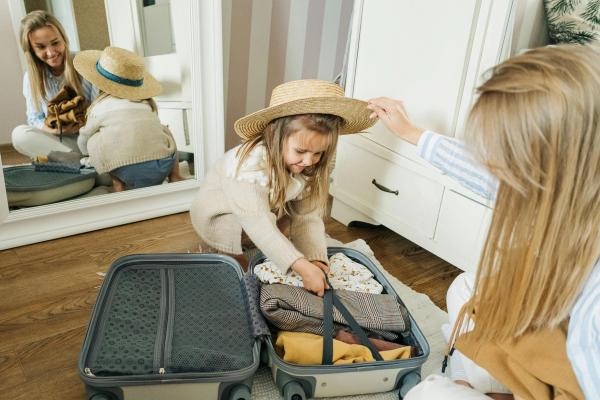
Navigating the Summer Holidays: Preparation, Fun, Safety, and Family Harmony

The summer holidays are upon us, and it's an opportune time to break out of the usual routine and venture beyond your own backyard. As the world opens up to overseas travel, ensuring that your holidays go smoothly is a pre-trip essential.
To help separated families navigate the issue of holiday travel, we've prepared some valuable tips. These will help you make the most of your summer fun and avoid arguments and conflict with your co-parent.
If you're facing challenges in negotiating your parenting arrangements for these holidays, get in touch for a free, 15-minute no-obligation chat about your situation. Let's ensure your holidays are safe and stress-free.
- Plan Ahead - Ensure Your Parenting Plan is Up to Date:
Beware the perils of booking non-refundable flights without an iron-clad agreement for overseas travel in place first!
Before diving into travel plans, check whether your current Parenting Plan or parenting orders permit overseas travel. If not, we can walk you through what you need to do to organise your trip.
Negotiating an arrangement directly with your co-parent and/or engage in dispute resolution is a good first step, if that is possible. Be prepared to show flexibility around your dates and to offer make up arrangements if the child will miss spending time with their other parent while they are away with you.
A parent wishing to take a child travelling overseas, even for a short holiday, should notify the other parent well before the proposed day of departure. This helps ensure a smooth and stress-free departure.
The opportunity for overseas travel for a child is exciting and a beneficial experience for them - but this has to be balanced against particular risks; including the safety of the destination and any chance of international abduction of the child. Those risks need to be assessed based on your individual situation, as each situation is different.
- Prioritise Your Children:
Holidays are about creating joyful experiences for your kids. Ensure they have everything they need for the trip, from passports to special items. Early preparation helps avoid last-minute stress. Check your children's passports and arrange both parents to sign the application form. Child Passport Renewals as the passport office consider them new applications for children under 16 years.
If you don’t have a passport for the child, then negotiating with your co-parent to get one or access it will become a necessity before any travel bookings can be made. We can also help you to organise a passport if there is disagreement about one being issued or renewed, where you can’t contact the other parent or where international citizenship issues are involved.
- Share Your Travel Plans:
Maintain open and transparent communication. Share your travel plans and itineraries with your ex-partner, as early as possible and keep them updated when things change. A good rule of thumb is to provide them with the information you would want to know about your child, if they were not travelling overseas with you.
Details of where you plan to go, how you will get there, who is travelling with you, where you will stay while you’re there, how you can be contacted while you’re away and your return date is essential. If you have parenting Orders in place, it is necessary to obtain authenticated consent from your co-parent before undertaking overseas travel as without it, you may be committing an offence. You should get legal advice if this applies to you.
- Communication for kids:
Let the other parent know you’ve arrived safely. Delays can happen but keeping your coparent updated about when you’re next able to organise a time for them to connect with the child can go a long way to reassure them and avoid unnecessary stress and conflict. If you’ve already agreed on a schedule, do your best to stick to it but inform them as soon as you can if it can’t be kept.
Having set times for your child to FaceTime time the parent back home can be important to maintain their bond with that parent, but you should be realistic about what you can achieve across time-zones also. If your child wants to connect with their other parent while they’re away, help them to do so.
This might mean some extra calls before you leave, or in while in transit, so when you land you can focus on exploring your new location for the first few days. The number of times your child should call the non-travelling parent will depend on their age, how long you are away for and how often they call the other parent when you’re not travelling.
If it’s the other parent travelling with you child and not you, stay flexible where you can. Sometimes plans change unexpectedly or the wifi service is sparse or not as strong as expected! Allow your kids to be share the excitement of their holiday with your ex-partner.
- Safety First:
Safety should be a top priority. Obtain comprehensive travel insurance and understand the medical facilities available at your destination. Stay informed about local regulations, including COVID-19 guidelines as various countries still have policies in place.
Visit the ‘SmartTraveller’ website to stay across travel risks across the world. Discuss with your co parent the level of travel warning you both feel comfortable with for your child, and what you both agree to do if a warning level escalates while you are visiting another country.
- 6. Entry requirements in other countries:
Many countries require children travelling without both parents to carry extra documents.
To enter, travel in or leave another country, your child may need:
- documents or evidence of the absent parent or guardian's permission to travel
- a copy of any separation, divorce or custody decree that proves custody of the child (plus authenticated consent if you do have parenting orders)
- a court order granting guardianship of the child
- adoption papers, if they're adopted
- a certified copy of their birth certificate, particularly if the travelling parent isn't listed on it.
You may be required to provide a letter of child travel consent if your child is travelling without both parents.
The letter usually contains:
- information about the child, including name, gender and place and date of birth
- information about who the child will be travelling with
- details about where the child will be travelling
- the child's passport information
- signatures from the parents, witnessed by a public official (such as a Justice of the Peace or notary public).
- The country your child is travelling to may also have their own paperwork that you need to complete before arriving at the border.
With these tips, travelling these holidays should be the way it is intended – exciting, relaxing and positively experienced by all. We’re here for you when you need us – so if things don’t quite go to plan in arranging your trip, during your trip or while your child is away with your co-parent, get in touch. Our team here at Parker Coles Curtis wish you and your families a wonderful and safe holiday period.


